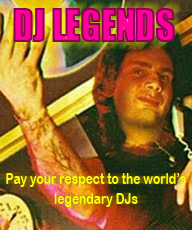Harmonic mixing
Harmonic mixing Posted on: 25.02.2012 by Daine Ziadeh I've been studying harmonic mixing and practicing and songs blend really nice with each other when you follow the Camelot wheel.One thing i noticed, while using VDJ is that some songs are on the C#m key, which this is not in the camelot wheel, what should i do to blend this key into another one? | |
| Cassie Sangermano 01.08.2012 |
Originally Posted by LoopCat
|
| Ming Devis 01.08.2012 |
Originally Posted by sesshin
Developing your ear and a bit of music theory is the way to go in my opinion. Listening to lots of different music and doing some light study on chord progressions and musical elements like contrast are really all you need to do. I find allot of musicians that are really theory driven play without feel and I would guess that would probably be the same with DJing. |
| Celine Surico 31.07.2012 |
Originally Posted by JulianVeloso
|
| Latina Samon 30.07.2012 |
Originally Posted by Emery
|
| Roseanna Signorini 27.02.2012 |
Originally Posted by Camelot
|
| Dorie Scelzo 27.02.2012 |
Originally Posted by Camelot
|
| Romelia Stankard 27.02.2012 |
Originally Posted by Camelot
|
| Cassie Sangermano 01.08.2012 |
Originally Posted by LoopCat
|
| Ming Devis 01.08.2012 |
Originally Posted by sesshin
Developing your ear and a bit of music theory is the way to go in my opinion. Listening to lots of different music and doing some light study on chord progressions and musical elements like contrast are really all you need to do. I find allot of musicians that are really theory driven play without feel and I would guess that would probably be the same with DJing. |
| Bryan Suga 01.08.2012 | One thing to keep in mind also is that sometimes you don't want to be locked into a rigid system. You need room to improvise and do unexpected things. In real music chord changes or note changes don't always go in a linear (chromatic) fashion. They jump around, sometimes playing harmonious, sometimes not. Sometimes it can sound good to do an unexpected key change. You just have to use your ears and hear if it works. I don't mix harmonically, but I do come to dj'ing from a music background, so probably do it instinctually. |
| Geri Jarra 31.07.2012 | Thanks. It seems that the reason for the debate on whether or not to use a chart is because it's almost as easy to learn by ear and choose songs based on feel then it would be to learn the complex system and rely heavily on key tags and software. Im sure knowing music theory would help with the latter |
| Celine Surico 31.07.2012 |
Originally Posted by JulianVeloso
|
| Geri Jarra 30.07.2012 | ok, so Em -> F#m ... or Em -> Bm? |
| Celine Surico 30.07.2012 | Playing the piano and figuring out scale and chord progressions helps a lot, no need for any harmonic mixing cheat sheets or tables.. |
| Geri Jarra 30.07.2012 | Im not sure if you answered my question. To be clear I want to know if the correct way to do it is to move from 9A -> 11A ... or 9A -> 10A? |
| Monique Swanier 30.07.2012 | I usually do 2songs then go up or down keys depending what Im feeling and sometimes to help boots it I go semitone. Lately though I been doing 2-1-2-semitone-ect. |
| Latina Samon 30.07.2012 |
Originally Posted by Emery
|
| Geri Jarra 30.07.2012 | My question is when harmonic mixing is it recommended to move up/down 1 "hour" at a time or 2/7 "hours" at a time. I have always heard different things. I don't mix harmonically too often edit- the interactive wheel says to move up 1 "hour" at a time.. so I guess that answers my question. But then why do people say to move by two, because its a whole semitone? |
| Bettyann Schat 30.07.2012 | A fully interactive demonstration of harmonic mixing is now available at http://www.camelotwheel.com/ Please note that it may take a while to load audio files. |
| Geri Jarra 30.07.2012 | yes, yes, yes and Abm |
| Latina Samon 30.07.2012 | So what do you do when the key isn't on the camelot wheel? Is D#m the same as E flat minor? A#m is the same as Bbm? A sharp major is B flat major? Whats G#m? |
| Joselyn Supina 28.02.2012 | The catholic church would only be mixing at middle school dances. Too much? |
| Roseanna Signorini 27.02.2012 |
Originally Posted by Camelot
|
| Dorie Scelzo 27.02.2012 |
Originally Posted by Camelot
|
| Romelia Stankard 27.02.2012 |
Originally Posted by Camelot
|
| Joselyn Supina 27.02.2012 | I believe harmonic mixing is handy when you layer a song on top of another and play both songs at the same time, but if you're layering a drum outro over a drum intro, I don't see where it's doing much. |
| Margie Pavell 26.02.2012 |
Originally Posted by Camelot
|
| Latoria Kavulich 26.02.2012 | lol. now back to the topic at hand eh |
| Antonetta Wikel 26.02.2012 |
Originally Posted by petarsun
|
| Bettyann Schat 26.02.2012 |
Originally Posted by WTFumbles
"All truths are easy to understand once they are discovered; the point is to discover them." - Galileo Galilei (1564 - 1642) |
| Darius Goralski 26.02.2012 | After reading this thread, I feel like the only person there that's found harmonic mixing to be beneficial... I've only been doing this for a few months but harmonic mixing seems to help 100% for cutting... just my opinion :/ |
| Odis Stirewalt 26.02.2012 |
Originally Posted by Xonetacular
Originally Posted by SpeshulEd
have used it a time and got away from it again to just trust my ears and feeling |
| Bettyann Schat 26.02.2012 |
Originally Posted by dope
You can sometimes get away with speed differences of up to 3%, but such mixes WILL tend to sound sour. This kind of "sour" still sounds better than mixing tracks in highly incompatible keys A speed difference of 6% means that matching speeds will change tracks by one semitone or "half-step." That's the difference between an E-Flat and an E. This is a useful technique in the advanced harmonic mixing technique of region shifting (see http://www.camelotsound.com/Advanced.aspx ). BTW: If you mix melodies in supposedly compatible keys, and the mix sounds sour, there is a high probability that keys are misreported. This highlights the advantages of using musician-keyed information rather than software-keyed information. |
| Joselyn Supina 26.02.2012 |
Originally Posted by Xonetacular
Plus listening to mixes by guys that tour the world and play to hundreds of thousands of people and realizing they're not mixing in key finally convinced me that it's not what its cracked up to be. Since I got my midi fighter and have been practicing with filters/effects, I'm now getting to the point where matching bpm's isn't even really necessary. Want to drop the bpm to slow things down, no problem, just throw some effects on and bam, perfect transition. The midi fighter makes things so easy. I just have to remember that not every song or transition needs effects. |
| Latoria Kavulich 26.02.2012 |
Originally Posted by petarsun
Originally Posted by bumtsch
|
| Denyse Waterland 26.02.2012 | play what sounds good to you, not just what a wheel tells you. sets will get so boring if everyone just does the same thing over and over |
| Kasi Marget 26.02.2012 | I also wonder, what about tracks that are not the exact same BPM ? Changing the pitch on one of the two tracks will change its key, unless you activate the "key mode" on Traktor or "Master tempo" on CDJs. And by activating these modes, you decrease the quality of the audio going out right ? So you would decrease the audio quality just to have matching keys ? That's silly. Therefore, mixing in key is only viable when 2 tracks are on the same bpm ? Well, that's some heavy limitation here. I don't believe i'll ever bother about this, and just play what sounds good to me. |
| Portia Zagula 26.02.2012 | I believe mixing in key is a very, very useful tool and can make your sets sound really clean. Albeit, its at the bottom of my list of importance when choosing my next song. The fact is, most dance music has a very minimal intro MADE for mixing. It'll either have no melody or very little melody at all, so in fact, the key of the song you're mixing into doesn't even matter. If a song does start off with a melody though, then I find that those are the best times to use the camelot wheel. Just don't let the wheel ever limit you, and don't feel like your going to be a bad DJ if you don't follow it with every mix. That's complete nonsense right there. |
| Bettyann Schat 26.02.2012 |
Originally Posted by petarsun
|
| Romelia Stankard 26.02.2012 |
Originally Posted by dj matt blaze
|
<< Back to General DiscussionReply



